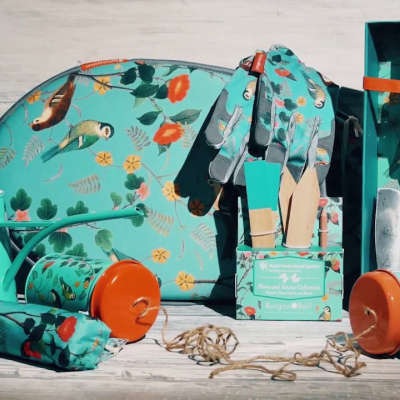Choosing the Best Gift
Choosing a gift for a family is a way to show care and attention. It's important to consider age, interests, and family traditions to ensure the present brings joy and becomes a symbol of love and support.
3 October 2024
The Significance of a Gift in Family Relationships
How to Consider the Age and Preferences of the Recipient
Gifts for Children: Original Ideas for Toddlers
Gift Ideas for Teenagers: Balancing Interests and Practicality
What to Gift Your Spouse: Useful and Romantic Options
Perfect Gifts for Parents and Elder Relatives
How to Consider Family Traditions When Choosing a Gift
Budget-Friendly Gifts: How to Delight Without Breaking the Bank
Handmade Gifts: A Creative and Heartfelt Approach
Unusual Family Gifts: How to Make Your Choice Memorable

The Significance of a Gift in Family Relationships
The significance of a gift in family relationships lies in its role as a symbol of love, care, and attention. Gifts help convey emotions that might be difficult to express in words, strengthening emotional bonds and fostering a supportive, trusting atmosphere within the family. It's not the price or complexity of the gift that matters most, but the sincerity behind it and its alignment with the recipient's needs and interests.
In family settings, gifts often serve as acts of acknowledgment, demonstrating the importance of one family member to another. A thoughtful gift that reflects a person’s interests or dreams shows not only that the giver knows the recipient well but is also willing to meet their emotional needs, thus reinforcing feelings of security and confidence in the relationship.
Gifts also help to solidify family identity. Symbolic or traditional gifts passed down through generations create a sense of continuity and shared values, allowing family members to feel connected to something greater than their daily lives.
For children, gifts become an educational tool, teaching them the family’s values. Explaining that a gift is more than just a material object helps children understand its significance as an expression of affection and thoughtfulness.
In moments of conflict, a well-timed gift can serve as a way to mend tensions, offering a reminder of the deep care that exists between family members. While not a substitute for dialogue, it can be a powerful gesture to help resolve disagreements and show commitment to the relationship.
The dynamics of family relationships are often reflected in gift-giving. In long-term relationships, gifts may become more practical or symbolic, representing shared experiences and achievements that strengthen the sense of unity and mutual support.
Gifts also express gratitude. By giving presents, family members say "thank you" for the love, care, and involvement in each other's lives, a gesture that can be especially important in long-term relationships where daily routines may overshadow the need for such expressions.
Additionally, gifts create lasting memories. A well-chosen gift can become a cherished reminder of a meaningful moment, and shared experiences or events can remain in the family’s collective memory for years.
Ultimately, in the context of family, a gift is more than just an object; it’s a form of communication, a way to show family members that they are loved, valued, and important. Each gift contributes to the emotional climate of the family, supporting harmony and balance in the relationships.
Gifts can also affirm the individuality and uniqueness of each family member. When chosen with personal qualities, interests, or achievements in mind, gifts highlight a person's distinctive role in the family, thus playing a crucial role in maintaining emotional closeness and strengthening family ties.
How to Consider the Age and Preferences of the Recipient
When choosing a gift, it is important to consider the age and preferences of the recipient, as this directly impacts their perception and the significance of the gift. Each stage of life comes with its own needs and interests, and a gift that aligns with this context will be perceived much more positively. For example, gifts for young children should be safe, educational, and appropriate for their level of understanding of the world, while teenagers may appreciate more complex and personalized items.
For young children, the best gifts are toys that stimulate their creative and motor development. These can include building blocks, drawing sets, or interactive games. It is essential to remember that at this age, children are often attached to specific characters or themes, so the choice of a gift should reflect their current interests. By considering their preferences, you not only delight the child but also support their development.
When it comes to teenagers, it is important to recognize that this is a time of active identity formation. Therefore, gifts should reflect their interests and passions. This can be anything from gadgets to books or sports equipment. Teenagers value self-expression, so it's best to choose gifts that allow them to showcase their individuality. Understanding their current hobbies will enable you to make a choice that brings them joy and excitement.
For adult and elderly family members, it is crucial to take into account their lifestyle, hobbies, and physical condition. Gifts can range from practical and functional to emotional and symbolic. For instance, if your parent enjoys gardening, tools or specialized plants could be an excellent choice. On the other hand, gifts related to health care, such as massagers or spa treatment vouchers, will be particularly relevant for elderly individuals.
Considering preferences and interests, you can also focus on gifts that promote shared experiences. For example, board games or creative kits can provide opportunities for family bonding and interaction. Such gifts not only bring joy but also strengthen relationships within the family, creating new shared memories.
An important aspect is also the personalization of gifts. Even a standard gift can be tailored to specific preferences by adding personal touches. For example, you could engrave a piece of jewelry or order a personalized calendar with family photos. Such details not only make the gift unique but also show that you took the time to select it, which is greatly appreciated.
Don’t forget about fashion and current trends, especially when choosing gifts for younger people. What was popular a few years ago may be irrelevant today. Studying modern trends and the interests of your loved one will help you not only select the right gift but also demonstrate your engagement in their life. This creates additional emotional resonance and strengthens the bond between you.
It is also helpful to discuss potential gifts in advance to understand what might be interesting or needed. Open communication about preferences allows you to avoid misunderstandings and disappointments, and helps uncover hidden desires that might go unnoticed. Often, people hesitate to openly express their needs, and this approach can help create a trusting atmosphere.
It’s important to remember that the main criterion is not the price of the gift, but how it will be perceived by the recipient. By considering age and preferences, you can choose something that will genuinely bring joy and be meaningful to the person. This not only strengthens your relationships but also creates a positive atmosphere in the family, based on mutual understanding and care.
Thus, by taking age and preferences into account, you not only make the gift more personal but also create an opportunity for emotional exchange, which is vital for family connections. Each gift can become a symbol of love and attention if it is chosen thoughtfully and with the recipient's unique characteristics in mind.
Gifts for Children: Original Ideas for Toddlers
When it comes to selecting gifts for toddlers, it's essential to consider their developmental stages, interests, and safety. Here are some original ideas that can delight little ones and foster their growth:
-
Interactive Learning Toys: Look for toys that combine fun and education, such as interactive books, musical instruments, or educational tablets designed for toddlers. These can help with language development and cognitive skills.
-
Personalized Storybooks: Create a storybook that features the child’s name and likeness. This unique gift not only encourages reading but also makes them feel special and engaged in the story.
-
Sensory Play Kits: Consider gifting kits that include various materials for sensory play, such as kinetic sand, water beads, or play dough. These kits stimulate creativity and provide hours of fun.
-
Balance Bikes: A balance bike is a fantastic gift that helps toddlers develop their balance and coordination skills while being an enjoyable way to explore outdoors.
-
Art Supplies: Provide a variety of non-toxic art supplies, such as crayons, washable markers, finger paints, and large sheets of paper. Encouraging creativity through art can be both fun and therapeutic.
-
Building Blocks or Stacking Toys: Choose colorful, oversized building blocks or stacking toys that are safe for toddlers. These toys promote fine motor skills, problem-solving, and imaginative play.
-
Play Kitchen Set: A play kitchen set can inspire imaginative play and help toddlers learn about cooking and food. Include play food items and utensils for added fun.
-
Soft Plush Animals: Look for unique and cuddly plush animals, especially those that can serve as comfort toys. Some plush toys come with educational elements, like sounds or lights.
-
Outdoor Exploration Kits: Gift an outdoor exploration kit that includes items like a magnifying glass, bug-catching tools, and a small backpack. This encourages curiosity about nature and outdoor activities.
-
Subscription Boxes: Consider a subscription box tailored for toddlers that delivers new activities or toys each month. This can provide ongoing excitement and engagement.
-
Musical Instruments: Simple musical instruments like tambourines, maracas, or xylophones can foster a love for music and help with auditory skills.
-
Puppet Theater Set: A puppet theater set allows for imaginative storytelling and role-play. It can also encourage language development and creativity.
-
Educational Puzzles: Look for puzzles.
Gift Ideas for Teenagers: Balancing Interests and Practicality
When choosing gifts for teenagers, it's essential to find a balance between their interests and practicality. This age is characterized by an active search for identity, so gifts should reflect the individuality of the young person while also being functional and useful in everyday life. By focusing on the teenager's interests, you can select a gift that is not only enjoyable but also beneficial.
-
Hobby Equipment: Consider gifts that align with the teenager's hobbies or passions. For instance, if your child enjoys drawing, a quality art supply set, professional markers, or watercolor paints can inspire creativity and help develop their skills. Similarly, for musicians, you can choose musical instruments, accessories, or lessons. This demonstrates support for their interests and helps nurture their talents.
-
Tech Gadgets: Teenagers typically use various devices frequently, so choosing gifts in this area can be very successful. High-quality headphones, portable chargers, or computer accessories can make for pleasant and practical gifts. New technology items, such as smartwatches or fitness trackers, also make excellent choices as they combine interesting features with practical applications.
-
Self-Expression: Teenagers value the ability to express themselves. Gifts that allow them to showcase their individuality, such as stylish clothing or unique accessories, can be particularly relevant. To avoid missteps, it’s wise to inquire about their tastes and preferences in advance. By considering fashion trends, you can select something that is not only beautiful but also meets modern standards.
-
Experiences: Gifts that create memorable experiences, such as tickets to a concert of their favorite band, attendance at sporting events, or workshops, can be a great choice. These gifts not only delight the teenager but also provide opportunities for shared time together, which is crucial for strengthening family bonds. Shared experiences can become cherished memories for a lifetime.
-
Sports Gifts: If the teenager is into sports, gifts related to their favorite activities will be appropriate. This could include new sports equipment, such as a ball, gear, or gym memberships. Supporting their hobbies shows that you value their interests and want to help them develop their physical skills, positively impacting their self-esteem.
-
Academic Tools: Practical gifts related to their studies can also be useful. This might include high-quality stationery, organizers, or electronic devices that assist with learning, such as tablets or e-readers. Such gifts help the teenager manage their time and make the learning process more interesting and comfortable.
-
Individualization: It's essential to remember that every teenager is unique, and what may appeal to one might not suit another. Therefore, consider not only their interests and hobbies but also your child's personality. By acknowledging their individuality, you can choose a gift that aligns with their personal preferences and truly makes them happy.
-
Personal Touch: Pay attention to personalizing the gift. Even standard items can be transformed by adding elements that reflect the teenager's character. For example, you might order a t-shirt with a unique print or engrave a personal message on an accessory. This makes the gift more meaningful and allows the teenager to feel understood and appreciated.
-
Social Awareness: Finally, it's important to recognize that teenagers are very sensitive to the perceptions of others. Therefore, when selecting a gift, consider not only their interests but also societal norms and expectations. A gift that serves as a source of pride can help enhance their self-esteem and confidence. Ultimately, a well-chosen gift will express your love and care while also being an important element of support in their development as individuals.
What to Gift Your Spouse: Useful and Romantic Options
Selecting a gift for your spouse requires special attention to their interests and needs. The gift should not only express your love but also be practical for everyday life. It’s important to remember that each gift can symbolize your care and consideration, serving as a reminder of how much you value your partner.
Practical Gift Ideas
-
Sports Accessories: If your spouse is into fitness, consider high-quality sports accessories such as a fitness tracker or professional home workout equipment. These gifts show your support for their healthy lifestyle and can help them achieve their fitness goals.
-
Kitchen Gadgets: If your partner enjoys cooking, think about gifting kitchen gadgets or cookware. This could include modern cutting tools, stylish pots, or even a barbecue set. Such gifts not only add value to home cooking but also open up new opportunities for spending time together in the kitchen.
Romantic Gift Ideas
-
Experiences: Romantic gifts play a vital role in keeping the spark alive in your relationship. Consider a gift certificate for a romantic dinner at a restaurant or tickets to a concert of their favorite band. These experiences can create unforgettable moments and strengthen your bond, showing that you care about their emotional needs and want to spend quality time together.
-
Personalized Gifts: Creating a personalized gift, such as a scrapbook of your shared photos or a book where you jot down all your memories together, can be particularly touching. This not only serves as a sentimental gesture but also allows you to reminisce about all the important moments in your journey together, becoming a symbol of your love and attachment.
-
Travel Accessories: If your spouse travels frequently, a useful gift could be a travel set that includes comfortable accessories like a neck pillow, eye mask, or a stylish suitcase. These gifts will help them feel comfortable while traveling and demonstrate your care for their convenience.
-
Hobby-Related Gifts: Consider gifts related to your spouse's hobbies. For instance, if they love photography, a new lens or a stylish camera bag would be appreciated. This type of gift not only supports their interests but also shows your genuine interest in their life.
-
Shared Experiences: Gifts that encourage shared activities can also be an excellent choice. A certificate for a joint workshop or a sports class offers not only entertainment but also strengthens your relationship. Shared experiences create lasting memories.
-
Thoughtful Gestures: Don’t underestimate the significance of small gestures. Sometimes, little signs of affection can mean more than grand gifts. Sweet notes with compliments or unexpected treats like their favorite dessert or a prepared breakfast in bed can bring a smile and uplift their spirits.
Conclusion
Ultimately, the key to successfully choosing a gift for your spouse lies in being attentive to their interests and needs. Strive to create a balance between practicality and romance, ensuring that your gift is not only useful but also touches their heart. This approach will help strengthen your relationship and remind your partner of their importance in your life.
Perfect Gifts for Parents and Elder Relatives
Choosing the ideal gift for parents and older relatives can be a thoughtful way to show your love and appreciation. When selecting a present, it’s important to consider their interests, lifestyles, and needs. Here are some ideas to help you find the perfect gift that will resonate with them.
Practical Gifts
-
Health and Wellness Products: Items that promote health, such as massage chairs, essential oil diffusers, or fitness trackers, can be thoughtful gifts. These not only cater to their physical well-being but also show that you care about their health.
-
Quality Kitchen Appliances: For parents who enjoy cooking, high-quality kitchen gadgets like air fryers, slow cookers, or coffee machines can be useful and appreciated. These tools can make meal preparation easier and more enjoyable.
-
Personalized Calendars or Planners: A personalized calendar featuring family photos or a beautifully designed planner can help them stay organized while cherishing family memories.
Experience Gifts
-
Family Gatherings: Organizing a family gathering or a surprise party can be a heartfelt gift. This allows everyone to come together and celebrate their love and bond, creating cherished memories.
-
Tickets to Events: Consider gifting tickets to concerts, theater shows, or sports events that they enjoy. This can provide them with a fun outing and a chance to experience something they love.
-
Classes or Workshops: Enroll them in classes that align with their interests, such as cooking classes, art workshops, or gardening courses. This not only provides them with a new hobby but also encourages social interaction.
Sentimental Gifts
-
Personalized Photo Albums: Creating a photo album or scrapbook filled with family memories can be a touching gift. This allows them to reminisce about special moments and feel connected to family history.
-
Custom Family Portraits: Commissioning a family portrait or caricature can be a unique way to celebrate your family bond. This artistic representation will be a lasting memory.
-
Memory Jars: Create a memory jar filled with notes from family members sharing their favorite memories or expressing love and appreciation. This heartfelt gesture can be a daily reminder of family support.
How to Consider Family Traditions When Choosing a Gift
Choosing a gift that aligns with family traditions can enhance its meaning and show respect for shared values and history. Here are some ways to thoughtfully incorporate family traditions into your gift selection process:
1. Understand the Family History
-
Research Traditions: Take time to learn about your family’s unique traditions and customs related to gift-giving. Some families may have specific occasions for exchanging gifts, while others may have particular themes or types of gifts that are favored.
-
Incorporate Legacy Items: Consider gifts that reference family heirlooms or traditions, such as a decorative item that has been passed down through generations. This can create a strong emotional connection.
2. Celebrate Milestones and Special Occasions
-
Recognize Important Events: Tailor your gifts to celebrate significant family milestones, such as anniversaries, birthdays, or holidays. For example, a gift that aligns with a family celebration can enhance the festive atmosphere.
-
Create Tradition-Specific Gifts: If your family has a tradition of giving practical gifts for holidays, consider items that align with this theme. For instance, if it’s customary to give handmade gifts, a hand-knit scarf could be perfect.
3. Personalize Gifts with Family Significance
-
Engraving and Personalization: Adding personal touches, such as engraving a meaningful date or family name, can make a gift more special. This helps to embed the gift within the family narrative.
-
Incorporate Shared Experiences: Think about gifts that can create new traditions or memories. For example, a family board game that can be played together during gatherings fosters a sense of unity.
4. Consult Family Members
-
Discuss Preferences: Open a dialogue with family members to understand their feelings about traditional gift-giving. They may have insights or preferences that can guide your choice.
-
Gather Ideas: Consider holding a family meeting or conversation where everyone can suggest gift ideas or express their preferences. This collaborative approach can lead to more thoughtful selections.
5. Reflect on Cultural Influences
-
Acknowledge Cultural Backgrounds: If your family has cultural traditions that influence gift-giving, incorporate elements that respect and celebrate these practices. This might include traditional foods, rituals, or customs associated with gift-giving.
-
Use Symbolic Gifts: Certain cultures have specific symbols associated with different occasions. For example, gifting plants or flowers may have a special significance in some cultures.
6. Emphasize Quality Over Quantity
-
Focus on Meaning: In families where the tradition emphasizes the significance of the gift rather than its monetary value, choose items that are thoughtful and meaningful rather than extravagant.
-
Craft or Handmade Gifts: In families that appreciate craftsmanship, a handmade item can convey love and effort. This aligns with the values of many traditional families.
Conclusion
When choosing a gift that considers family traditions, the goal is to connect emotionally and honor shared values. By understanding the family’s history, celebrating milestones, personalizing gifts, consulting family members, respecting cultural influences, and emphasizing quality, you can select gifts that strengthen familial bonds and create lasting memories. Ultimately, a well-considered gift that aligns with family traditions can enhance relationships and show appreciation for the unique fabric of your family.
Budget-Friendly Gifts: How to Delight Without Breaking the Bank
Choosing thoughtful gifts on a budget is entirely possible and can be just as meaningful as more expensive options. Here are some tips and ideas for budget-friendly gifts that can bring joy without stretching your finances:
1. Personalized Handmade Gifts
-
DIY Projects: Create something special with your own hands, such as homemade candles, baked goods, or handcrafted art. These gifts can carry significant sentimental value and show that you put effort into the creation.
-
Photo Albums or Scrapbooks: Compile cherished memories into a photo album or scrapbook. Personal touches like notes and decorations can make it a heartfelt gift that won’t cost much.
2. Thoughtful Experiences
-
Plan a Fun Day Together: Instead of a physical gift, consider planning an outing, such as a picnic in the park, a movie night at home, or a day of hiking. Shared experiences can be more valuable than material items.
-
Offer Your Skills or Time: Offer to help with a task or chore that the recipient might find burdensome, like gardening, cleaning, or running errands. This gesture can show your appreciation and strengthen your bond.
3. Creative Gift Wrapping
-
Make Your Wrapping Unique: Use recycled materials like newspaper, fabric, or old maps for wrapping gifts. Personalize the wrapping with drawings or notes, making the presentation part of the gift.
-
Gift Bags and Tags: Create your own gift tags and bags using craft supplies. This adds a personal touch without additional expense.
4. Group Gifts
-
Collaborate with Others: Team up with friends or family to give a joint gift. Pooling resources can allow you to afford a more significant gift while keeping individual contributions low.
-
Plan Group Experiences: Instead of individual gifts, consider organizing a group outing or event, like a game night or a potluck dinner, where everyone brings a dish.
5. Thoughtful, Low-Cost Items
-
Books or Journals: A thoughtfully chosen book or a beautiful journal can be a cherished gift. You can often find great options at secondhand stores or sales.
-
Plant or Succulent: A small potted plant or succulent is an affordable yet meaningful gift. It adds life to a space and shows thoughtfulness.
6. Crafty Gift Certificates
-
Create Your Own Coupons: Design coupons that offer services, such as a home-cooked meal, babysitting, or a day of companionship. These gifts can be more meaningful than physical items.
-
Volunteer Time Together: Offer to spend time volunteering together for a cause that the recipient cares about. This creates shared memories and helps the community.
7. Utilize Sales and Discounts
-
Shop Smart: Keep an eye on sales, discounts, or clearance items. Many stores have sales around holidays or special occasions, allowing you to find quality items at reduced prices.
-
Use Coupons and Loyalty Programs: Take advantage of coupons, loyalty points, or cashback offers when shopping for gifts.
Conclusion
Being on a budget doesn’t mean you have to sacrifice thoughtfulness or creativity when it comes to gift-giving. By focusing on personalized, handmade, or experience-based gifts, you can create memorable and meaningful presents that resonate with your loved ones. Remember, it’s the thought and effort behind the gift that truly counts, and even simple gestures can convey love and appreciation.
Handmade Gifts: A Creative and Heartfelt Approach
Creating handmade gifts is a wonderful way to show your love and appreciation for someone special. These gifts not only carry a personal touch but also reflect the time and effort you've invested in making something unique. Here are some ideas and tips for crafting thoughtful gifts by hand:
1. Personalized Crafts
-
Customized Mugs: Use ceramic paint or markers to personalize a plain mug with quotes, drawings, or the recipient's name. This practical gift adds a personal touch to their daily routine.
-
Handmade Jewelry: Create bracelets, necklaces, or earrings using beads, wires, or natural materials. Consider the recipient’s style and preferences to make something they will cherish.
2. Creative Home Décor
-
Decorative Photo Frames: Buy plain frames and decorate them with paint, fabric, or embellishments that match the recipient’s home style. Include a favorite photo to make it even more special.
-
DIY Candles: Make scented candles in decorative jars using wax, essential oils, and wicks. You can customize the scent and color to suit the recipient’s preferences.
3. Homemade Treats
-
Baked Goods: Bake cookies, brownies, or cakes, and package them in a decorative box or tin. Include a handwritten recipe card for an extra touch.
-
Jams or Preserves: Make homemade jams or preserves using seasonal fruits. Package them in jars with personalized labels for a delightful and tasty gift.
4. Thoughtful Keepsakes
-
Memory Jars: Fill a jar with notes of cherished memories, quotes, or reasons you appreciate the recipient. This gift can serve as a source of joy and comfort.
-
Scrapbooks: Create a scrapbook filled with photos, mementos, and written memories shared together. This gift can celebrate a special relationship or milestone.
5. Craft Kits or DIY Projects
-
Create a DIY Kit: Assemble a kit for a project related to the recipient's hobbies, such as knitting, painting, or gardening. Include all the necessary materials and instructions.
-
Custom Recipe Book: Compile a book of favorite recipes, adding personal notes or tips for each dish. This thoughtful gift is perfect for someone who loves to cook or bake.
6. Experience Gifts
-
Handwritten Coupons: Make coupons offering various services, such as a homemade dinner, a movie night, or help with chores. These experiences can create lasting memories together.
-
Plan a Crafting Session: Gift a fun crafting day together, where you can both create something special. This allows for quality time while making unique projects.
7. Upcycling and Repurposing
-
Transform Old Items: Take something old and give it new life. For example, repaint or reupholster a piece of furniture, or create art from recycled materials.
-
Repurposed Decor: Use materials from around the house to create new items, such as turning glass jars into candle holders or plant pots.
Conclusion
Handmade gifts carry a unique charm and sentiment that store-bought items often lack. By infusing your creativity and personal touch into each gift, you can create meaningful treasures that reflect your relationship with the recipient. Whether it's through personalized crafts, delicious treats, or thoughtful keepsakes, handmade gifts can strengthen bonds and create lasting memories. Remember, the time and effort you invest in creating these gifts are what make them truly special.
Unusual Family Gifts: How to Make Your Choice Memorable
Choosing an unusual family gift can create lasting memories and strengthen bonds among family members. Here are some ideas and tips for selecting memorable gifts that stand out:
1. Experience-Based Gifts
-
Family Adventure Day: Plan an outing that includes activities everyone can enjoy, such as a hot air balloon ride, zip-lining, or visiting an amusement park. Experiences create lasting memories that can be cherished together.
-
Workshop or Class: Gift a family class in something fun and unique, like pottery, cooking, or dance. This not only provides a shared experience but also allows family members to learn something new together.
2. Customized Family Portraits
-
Unique Art Style: Commission a local artist to create a family portrait in an unusual style, such as caricature, abstract, or watercolor. This one-of-a-kind artwork can become a cherished piece in your home.
-
Photo Collage: Create a personalized collage that includes photos from various family events and milestones. You can even frame it or have it printed on canvas for a more artistic look.
3. Family Subscription Services
-
Monthly Subscription Box: Choose a subscription box that aligns with the family’s interests, such as a snack box from around the world, a book club selection, or a craft kit. Each month’s delivery will remind them of your thoughtful gift.
-
Streaming Service Subscription: Gift a subscription to a streaming service for movies, documentaries, or educational content, allowing for family movie nights or educational discussions.
4. Personalized Family Games
-
Custom Board Games: Create a personalized version of a popular board game with family inside jokes or memorable moments. This adds a unique touch and fosters family bonding during game nights.
-
Trivia Game: Design a trivia game that includes questions about family history, shared experiences, or favorite memories. It’s a fun way to reminisce and learn more about each other.
5. Unique Home Decor Items
-
Family Tree Art: Commission or create a family tree artwork that beautifully illustrates your family's lineage. This can serve as a meaningful centerpiece in your home.
-
Custom Map Art: Design a map highlighting significant places for your family, such as where everyone was born, favorite vacation spots, or where family members currently live.
6. Memory-Making Kits
-
Memory Jar: Create a memory jar filled with prompts for family activities or topics to discuss at family gatherings. This encourages interaction and helps create shared experiences.
-
Time Capsule: Provide materials for a family time capsule, where everyone can contribute items or notes about their current lives. Set a future date to open it together, adding an element of anticipation.
7. Quirky Gifts
-
Customized Puzzle: Turn a family photo into a puzzle for a fun family activity. Completing the puzzle together can be a great bonding experience.
-
Funny Family T-Shirts: Create T-shirts with funny family slogans, inside jokes, or nicknames. Wearing them together can foster a sense of unity and fun.
8. Charitable Gifts
-
Donation in Their Name: Make a donation to a charity that holds significance for your family, and present it as a gift. This not only makes a difference but also emphasizes shared values and compassion.
-
Volunteer Together: Organize a family volunteering day at a local charity. This experience can be fulfilling and strengthen family bonds through shared giving.
Conclusion
Unusual family gifts have the power to create unforgettable moments and strengthen connections. By focusing on experiences, personalization, and creativity, you can choose gifts that resonate with your family’s unique dynamics. The key is to select something that reflects your family’s interests and values, ensuring that the gift is not just memorable but also meaningful. No matter what you choose, the thoughtfulness behind the gift will shine through, making it a cherished part of your family's story.




